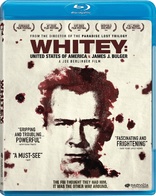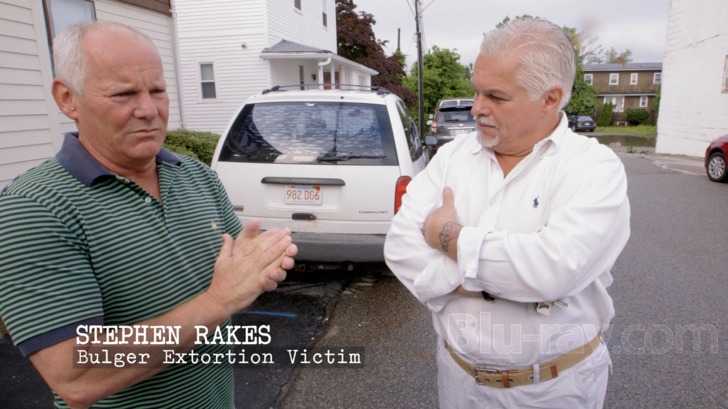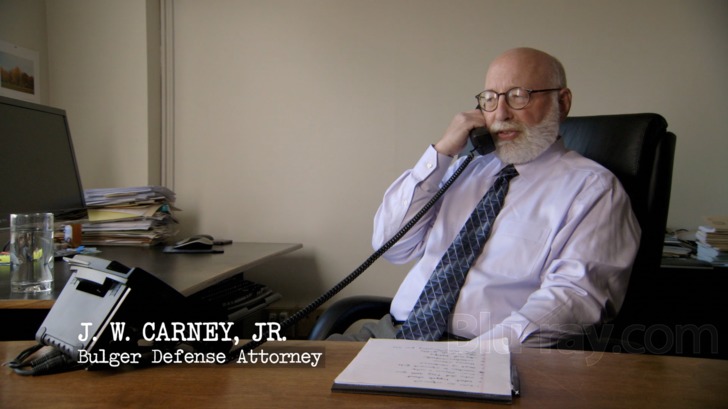Whitey: United States of America V. James J. Bulger Blu-ray Movie
HomeWhitey: United States of America V. James J. Bulger Blu-ray Movie 
Magnolia Pictures | 2014 | 107 min | Rated R | Oct 14, 2014
Price
List price:Amazon: $16.46 (Save 3%)
Third party: $16.46 (Save 3%)
Only 2 left in stock (more on the way).
Movie rating
7 | / 10 |
Blu-ray rating
| Users | 0.0 | |
| Reviewer | 4.0 | |
| Overall | 4.0 |
Overview
Whitey: United States of America V. James J. Bulger (2014)
James 'Whitey' Bulger was the most notorious American gangster of the 20th Century. His trial in 2013 profiled a long and deadly criminal career and exposed corruption at the highest levels of law enforcement.
Starring: Stephen Rakes, James 'Whitey' Bulger, Tommy Donahue, David Boeri, Steve Davis (XLVII)Director: Joe Berlinger
| Documentary | Uncertain |
| Biography | Uncertain |
| Crime | Uncertain |
Specifications
Video
Video codec: MPEG-4 AVC
Video resolution: 1080p
Aspect ratio: 1.78:1
Original aspect ratio: 1.85:1
Audio
English: DTS-HD Master Audio 5.1 (48kHz, 24-bit)
Subtitles
English SDH, French, Spanish
Discs
25GB Blu-ray Disc
Single disc (1 BD)
BD-Live
Playback
Region A (B, C untested)
Review
Rating summary
| Movie | 4.0 | |
| Video | 4.0 | |
| Audio | 4.0 | |
| Extras | 2.0 | |
| Overall | 4.0 |
Whitey: United States of America V. James J. Bulger Blu-ray Movie Review
Legendary, but No Hero
Reviewed by Michael Reuben December 21, 2014James "Whitey" Bulger was one of the most notorious gangsters in modern America, even before he served as the model for Jack Nicholson's Irish godfather in The Departed. Anyone who lived in the Boston area during Bulger's reign in the Seventies and Eighties knew his name, and anyone who had the bad luck to trip over his interests knew more than that. After Bulger fled in December 1994, tipped off by an FBI source just ahead of a sweep that netted his top lieutenants, he became a legendary figure on the Most Wanted List, evading capture for over sixteen years, possibly with help from inside the Bureau. When Bulger was finally apprehended in Santa Monica, California, in June 2011, he was 81 years old. It was his first arrest since 1956, when he served time for armed robbery and truck hijacking, including a stint in Alcatraz. When Bulger returned to Boston for trial on 32 counts of murder, drug-dealing and racketeering, the families of his many victims looked forward to a long-delayed reckoning. But that wasn't what happened. As shown in Whitey: United States v. James J. Bulger by documentarian Joe Berlinger (best known for the Paradise Lost Trilogy about the falsely accused West Memphis Three), Bulger's trial only added to the layers of myth and obfuscation surrounding his criminal career. That he was a criminal, Bulger never disputed (though he denied responsiblility for specific acts charged in his indictment, claiming that his subordinates had cut deals by blaming their crimes on him). The question was how such a vicious thug had managed to operate with impunity for so long, even though everyone, from the Justice Department to the local police, knew who he was and what he was doing. Bulger wanted to testify that he had received immunity from the federal government, but when the judge hearing his case disallowed the defense, "Whitey" refused to take the stand. The much-anticipated day when the elusive mobster would tell his version never arrived, and once the trial concluded with his conviction, Bulger has been prevented from giving interviews while in prison. He has been heard only when Berlinger was allowed to record telephone conversations between the defendant and his attorneys—which makes Whitey a unique entry in the ever-expanding chronicle of Bulger's mysterious saga.

(Note: According to one review, the version of Whitey that played Sundance was 129 minutes long. The official press notes for the film’s general release list the running time at 107 minutes, which is the length on Blu-ray. It is likely that Berlinger tightened the film after early reviews complained of excessive length.) Berlinger had long been fascinated by Bulger but didn't think he could add anything to the extensive volumes written about him, many by local journalists who had been covering the story for years. When Bulger was unexpectedly captured and brought to trial, however, Berlinger saw an opportunity to approach the story from a new angle by using the trial, however it unfolded, to re-examine Bulger's rise and fall. As Whitey recounts that story—through newly recorded interviews with the attorneys for both sides, families of the victims, local commentators and reporters, former members of law enforcement and star government witness Kevin Weeks, who was one of Bulger's top enforcers—Berlinger keeps returning to the federal courthouse in Boston, tracking the trial's progress, as it grinds forward to Bulger's conviction. Central to the trial, and to Bulger's criminal career, is his relationship with the FBI. What so effectively turned cohorts like Weeks against Bulger was the revelation that their boss had been one of the Bureau's confidential informants for years. A 700-page file documented Bulger's tips, supplied to his handler, Special Agent John Connolly, and Bulger's name appeared on hundreds of applications for warrants and wiretaps used in the FBI's successful war against the Mafia. According to one version of Bulger's legend, he traded this information for protection and favorable treatment from law enforcement. Indeed, one retired state police official recounts how, as soon as his task force planted a listening device in a Bulger hangout, the gang was instantly tipped off about the bug. At Bulger's trial, however, his attorneys startled everyone by taking an entirely different approach. Bulger, they argued, was never an FBI informant. According to Bulger, he did get favorable treatment, but he paid for it. FBI agents were as corruptible as anyone else, and he gave them envelopes of cash to look the other way. To the U.S. Attorney at the time, Jeremiah O'Sullivan, Bulger offered protection from a Mafia contract, in exchange for which O'Sullivan promised to grant Bulger immunity for his crimes. The government dismissed this defense argument as a fiction intended to burnish Bulger's reputation as an upstanding wise guy who had never been a "rat", but, as Berlinger recounts, there are serious questions regarding the authenticity of Bulger's informant file, especially when it is examined in detail and compared to the files of other confidential informants. Berlinger also describes instances—some recounted by the person involved, other reflected in documents obtained by the defense with great difficulty—where FBI agents attempted to change Bulger's internal designation from "informant" to "target", but were summarily overruled from above, without explanation. Was Whitey Bulger the Informant a fiction created by the government to assist in their pursuit of the Italian mob? Had federal authorities allowed a vicious felon to plunder and kill freely just to shore up their cover story? As Berlinger interviews the three prosecutors who convicted Bulger, they scornfully reject the defense theory as Bulger's attempt to secure his place in the pantheon of gangster heros. But they never address the flip side of their case, which is simply this: If Bulger was the Bureau's informant, then the FBI and the Justice Department must have decided that his information was worth turning a blind eye to his criminal activities—and shouldn't they be held accountable for the decades of murder and racketeering that Bulger committed while law enforcement protected him because they found him useful? A sense of the devastation that Bulger left in his wake is conveyed by survivors of some of his victims, who have spent years waiting to see their loved ones' killer brought to justice. Many testified at trial (though one prospective witness, who was unexpectedly dropped from the government's witness list, died under mysterious circumstances while the trial was still in progress). Patricia Donahue describes losing her husband, Michael, who offered a ride home to his neighbor, a gangster with whom Bulger had a dispute; both men were executed in Michael Donahue's car. (According to Bulger lieutenant Kevin Weeks, this is what happens when you hang out with gangsters and wise guys—or, one might say, have the bad luck to live next door to them.) Steve Davis is still in mourning for his sister, Debra, who loved Bulger's right-hand man, Steve Flemmi, and wanted to marry him. Bulger strangled her, because she knew too much. David Wheeler's father, Roger, was a businessman from Tulsa, Oklahama, and the owner of World Jai Alai; he was executed in his car at his country club after uncovering a skimming operation conducted by Bulger and his associates. Bulger committed these and many other crimes while being shielded by the FBI, but to date the only member of law enforcement to be jailed for any involvement is Bulger's direct handler, John Connolly. Berlinger tells this complicated story clearly and methodically, always returning to Bulger's trial and its relentless march toward a conviction that was largely a foregone conclusion, because the government had testimony from Bulger's key associates directly linking him to so many crimes. In the end, it may be impossible ever to know for certain exactly what kind of relationship existed between Bulger and the FBI, but it also may not matter. What is beyond dispute is that one of the most cunning and dangerous thugs ever to terrorize an American city operated for years with the full knowledge and tacit approval of federal law enforcement officials, preying on legitimate businesses and killing anyone who got in his way. When a younger group of agents finally had enough of Bulger, his FBI cronies made sure he got away. Not until he was an old man did he face trial, and since then he's been held incommunicado. Clearly the FBI and Justice want this sordid chapter of their past neatly wrapped up and locked away. Thanks to Berlinger's film, that won't happen.
Whitey: United States of America V. James J. Bulger Blu-ray Movie, Video Quality 

Whitey was shot digitally by Berlinger's Paradise Lost cinematographer, Robert Richman, with additional photography by Étienne Sauret, who has been the DP on several documentaries for Eugene Jarecki (Why We Fight). The contemporary interviews have been melded with news footage, both current and historical, as well as ancient video surveillance recordings, photographs and other archival source and, in a first for Berlinger, reconstructions of scenes from the Bulger trial using computer graphics to display the testimony and attorney statements over photos of the courtroom and participants. (As Berlinger explains in the extras, he was forced to adopt this approach, because the federal courts do not permit cameras.) Magnolia's 1080p, AVC-encoded Blu-ray, which was presumably sourced from digital files, provides a sharp, clean and detailed image with naturally saturated color for the new interviews; in the archival material, the image is as good as the source will allow. Aliasing and video noise can sometimes be seen, e.g., in the aerial shots of the federal courthouse, but these are minor occurrences that are momentary distractions at most. The most important quality for a hi-def image with a documentary like Whitey is to convey all the tiny flickers of emotion in the faces of the various speakers, as well as the details of the documents on which Berlinger chooses to linger. Magnolia's Blu-ray more than accomplishes the job.
Whitey: United States of America V. James J. Bulger Blu-ray Movie, Audio Quality 

As with most documentaries, Whitey's 5.1 soundtrack, encoded in lossless DTS-HD MA, is front-oriented, with emphasis on the voices of the interview subjects, which are rendered with perfect clarity, despite the heavy Boston accents. This includes Bulger, who is heard only as a voice at the other end of a telephone. The track featues an effective score by Wendy Blackstone, who scored the third part of the Paradise Lost Trilogy, Paradise Lost 3: Purgatory.
Whitey: United States of America V. James J. Bulger Blu-ray Movie, Special Features and Extras 

- Deleted Scenes (1080p; 1.78:1; 12:58): The scenes are not listed, and cannot be selected, individually. If there's one that should have been kept, it is the example provided by Boston Globe columnist Kevin Cullen of how Bulger would commit two murders, then tip the FBI that the second victim committed the first murder, thereby both preserving his informant status and concealing his own guilt.
- Sundance Film Festival Interviews (1080p; 1.78:1; 4:26): These brief interviews come from the film's Sundance premiere. Interviewees are Dave Boeri, senior reporter for Boston's WBUR, whose trial commentary is featured throughout Whitey and who is listed as a "consulting producer"; defense attorney Hank Brennan; and director Joe Berlinger.
- Theatrical Trailer (1080p; 1.78:1; 2:26).
- Also from Magnolia Home Entertainment: The disc includes trailers for Frontera, The Two Faces of January and Life Itself, as well as promos for the Chideo web service and AXS TV. These also play at startup, where they can be skipped with the chapter forward button.
- BD-Live: As of this writing, attempting to access BD-Live gave the message "Check back later for updates".
Whitey: United States of America V. James J. Bulger Blu-ray Movie, Overall Score and Recommendation 

Even if the truth about Whitey Bulger's dealing with law enforcement can never be known, the lesson that emerges with overwhelming conviction from Whitey is that the practice of using confidential informants is dangerously subject to abuse. It doesn't matter whether the abuse comes from cops and prosecutors trying to build careers (as Bulger and his lawyers claim) or from wily scoundrels playing "good guys" off against one another. As soon as the authorities decide that some criminals should be left alone for the sake of netting "bigger" fish, corruption has already set in. The team of prosecutors that convicted Bulger also worked hard to prevent his trial from becoming an inquiry into how Bulger turned the FBI's Boston office into a shield for criminal activities. Were they keeping the focus on the defendant's crimes (as they claim), or were they covering their department's rear end? Watch Whitey and decide for yourself. Highly recommended.
Similar titles
Similar titles you might also like

Prohibition
2011

Fahrenheit 11/9
2018

The Look of Silence
2014

Inside Job
2010

The Armstrong Lie
2013

Why We Fight
2005

Dinosaur 13
Director's Cut
2014

Waiting for "Superman"
2010

Capitalism: A Love Story
2009

Enron: The Smartest Guys in the Room
2005

Cocaine Cowboys: Reloaded
2006

West of Memphis
2012

Sicko
2007

Bowling for Columbine
2002

The Kid Stays in the Picture
2002

Three Identical Strangers
2018

Food, Inc.
2008

Freakonomics
2010

A Place at the Table
2012

An Inconvenient Sequel: Truth to Power
2017